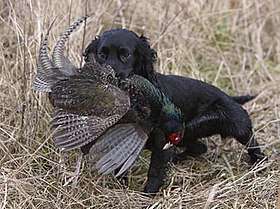Hunt test
A hunt test is an event at which the natural ability and training of gun dogs are evaluated against a written standard. Each dog that meets this standard earns a pass. This is unlike a field trial in which dog/handler teams compete against one another with only one dog being declared the winner.

Hunt tests are for example organized by the American Kennel Club (AKC), the North American Hunting Retriever Association (NAHRA), the United Kennel Club (UKC) under the auspices of the Hunting Retriever Club (HRC), and the Société Centrale Canine (SCC).
Organizers in North America
American Kennel Club hunt tests
The American Kennel Club (AKC) awards the titles of Junior Hunter (JH), Senior Hunter (SH), Master Hunter (MH) and Master National Hunter (MNH) for performance in hunt tests. The standards for the various levels are designed to approximate the situations and conditions encountered when hunting. Dogs are required to prove the ability to retrieve and find birds. The AKC provides different hunt test formats for different types of gun dogs. There are tests for nonslip retrievers, flushing spaniels, and pointing breeds.
North American Hunting Retriever Association hunt tests
The North American Hunting Retriever Association (NAHRA) awards the titles Started Hunting Retriever (SR), Working Retriever (WR), Master Hunting Retriever (MHR), and Grand Master Hunting Retriever (GMHR). The standard of training for the higher levels of NAHRA hunt test require a more advanced degree of training than those of AKC hunt tests. These simulate actual hunting by testing for the following skill sets. Quartering, trailing a crippled duck, and sit to flush. NAHRA tests are primarily for nonslip retrievers, although many spaniel and versatile breeds may compete. Poodles, and Nova Scotia Duck Tolling Retrievers(NSDTR) are often found on the NAHRA scene.
Conservation of game through the development of trained retrievers. The first organization dedicated to preserving hunting retriever skills. NAHRA, incorporated in 1984, is the originator of standards-based retriever field testing using realistic hunting scenarios. Dogs compete against a set of standards set forth in our rule book, not each other. Advanced titles require dogs to demonstrate proficiency in both upland and waterfowl work. Field tests are realistic, simulated hunting scenarios, with distances and conditions that hunters would encounter in the field. NAHRA supports clubs throughout the United States and Canada.
United Kennel Club retriever hunt tests
The United Kennel Club (UKC), in conjunction with hunt test events held under the organizational auspices of the Hunting Retriever Club Inc. (HRC) and its affiliated regional clubs, awards the titles of; Started Hunting Retriever (SHR), Hunting Retriever (HR), Hunting Retriever Champion (HRCH) and Grand Hunting Retriever Champion (GRHRC). There is also an Upland Hunter (UH) title awarded to dogs that pass a separate and distinct upland hunting test which can be run inconjuction with a regular test as a stand-alone test. To gain these titles there are four levels of testing where dogs earn points toward these specific titles. Each of these tests are of increasing difficulty and require increasing refinement in skill level that a hunting retriever must demonstrate while under judgment. These test levels are the; Started, Seasoned and Finished tests which are offered by regional HRC clubs. The final and most difficult level of test is called the “Grand” which is held twice a year by the HRC Inc. where all dogs that have previously earned the HRCH and UH title can be tested for the GRHRC title. As mentioned previously there is a separate upland hunter test that is also offered by local HRC clubs. These titles, once earned, are used as a prefix to the dogs registered name in the UKC.
A typical HRC hunt test will be a one-day event with the tests divided into two series of evaluations; these consist of the land series and the water series. In each series of the test the dogs are evaluated on their marking, memory, control and in the upper stakes honoring another dog. Marking is the ability of the dog to go directly to the area of fall and retrieve the bird regardless of the factors that might influence the dogs ability of travel to the area of the fall. Memory is the dogs ability to remember multiple falls regardless of the factors. Control is the dogs ability to walk to and from the line obediently. As well as taking the handler's commands on a mark that the dog has failed to mark and on the blind retrieve.
These HRC hunt tests try to simulate as closely as possible actual hunting situations where the dogs are tested at realistic hunting ranges with the handlers wearing appropriate hunting attire and demonstrating safe gun handling practices while handling and firing a shotgun loaded with blanks called poppers. Also the bird throwers, known as “Bird Boys”, are hidden from view of the dog under test.
See also
- Hunting dog
- Dog sports
- Championship (dog)
References
- Roettger, Anthony (2004). Urban Gun Dogs: Training Flushing Dogs for Home and Field. The Writer's Collective. ISBN 1-59411-050-6.